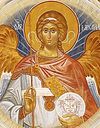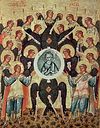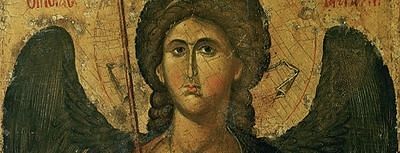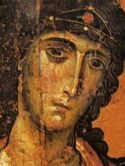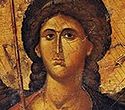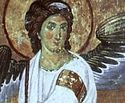

| Previous day | Next day |
| Old Style
November 8
|
Tuesday |
New Style
November 21
|
| 25th Week after Pentecost. Tone 7. | No fast.
|
![]() Synaxis of the Archangels Michael, Gabriel, Raphael, Uriel, Salaphiel, Jegudiel, Barachiel, and Jeremiel and the Other Bodiless Powers.
Synaxis of the Archangels Michael, Gabriel, Raphael, Uriel, Salaphiel, Jegudiel, Barachiel, and Jeremiel and the Other Bodiless Powers.
Righteous Maria, princess of Pskov (Martha in monasticism) (1300).
New Martyr Michael the Blessed, of Chernigov (1922).
St. Tysilio, prince of Powys, abbot, of Meifod, Wales (7th c.). St. Willihad, bishop of Bremen (Germany) (789). Seventy Monk-martyrs of the Archangel Michael Monastery at Prevlaka (Montenegro), poisoned by the Latins (1452).
Repose of Nun Barbara of Birsk (1903), Elder Photius of Valaam (1942), Metropolitan Philaret (Voznesensky) of New York (1985), and Priest George Calciu of Romania and Alexandria, Virginia (2006).
Thoughts for Each Day of the Year
According to the Daily Church Readings from the Word of God
By St. Theophan the Recluse

Tuesday. [II Thess. 1:10-2:2; Luke 12:42-48]
The parable about the steward shows how a Christian should behave with relation to worldly things. A steward diligently does his work, but in his heart he is not attached to anything, he is free from all bonds, he relates to everything outwardly. So also must a Christian be in relation to all worldly things. But is this possible? It is possible. As there exists outward piety without inner piety, so worldliness which is only outward is possible without inner bonds. But in such a case, will everything around us turn into a single lifeless form, emitting coldness like a marble statue? No; in the midst of worldly things another life will develop which is more attractive than the fullest worldliness. Worldly things, being worldly things, truly will remain as the form, while that which warms the heart will start to proceed from another source, and whosoever drinketh from this source will no longer thirst. But then, is it better to drop everything? Why? Even one who outwardly drops everything can still be attached in his heart, and one who does not outwardly drop everything can be free from bonds. Of course it is more convenient for one who outwardly renounces everything to control his heart. Choose what is more convenient for you; just be disposed as the Lord commands.
Articles
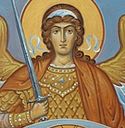 Synaxis of the Archangel Michael & the other Bodiless Powers: Gabriel, Raphael, Uriel, Salaphiel, Jegudiel & BarachielThe name Michael means "Who is like God?" and Gabriel means "God is mighty." |

